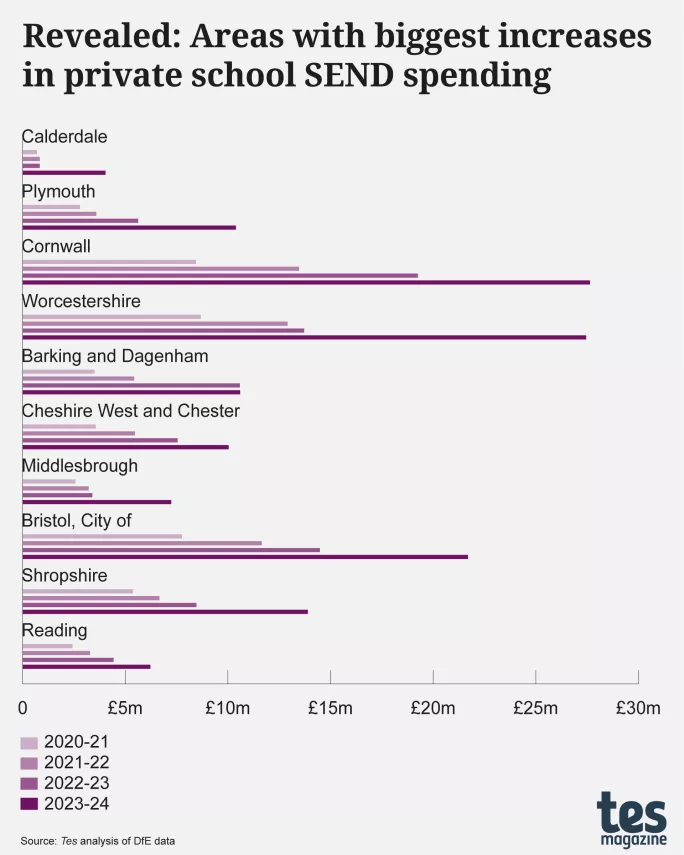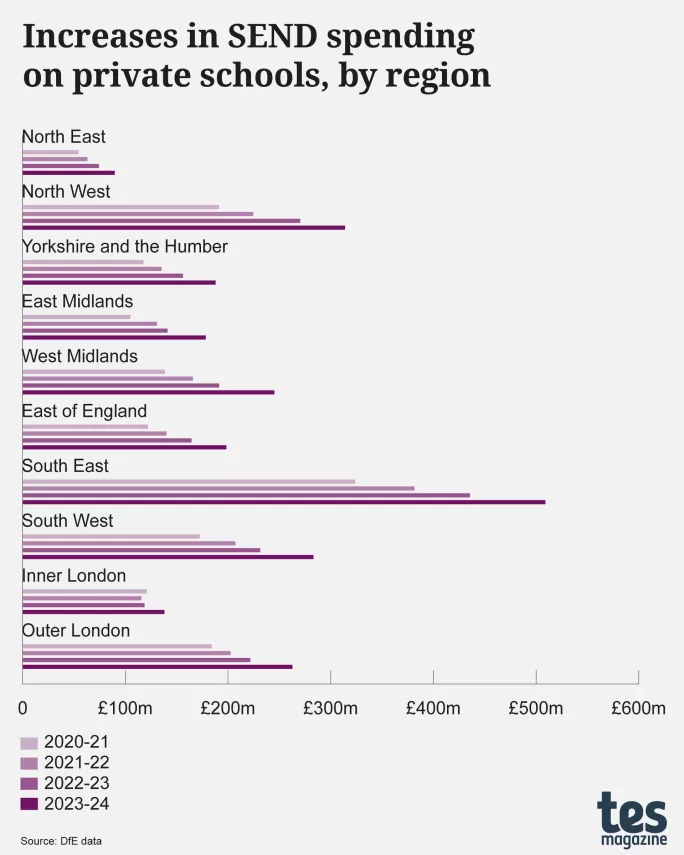- Home
- News
- Specialist Sector
- SEND plans will fail to stop private school costs from soaring, DfE warned
SEND plans will fail to stop private school costs from soaring, DfE warned

Government reforms will fail to curb spending on independent special schools, experts are warning, as a Tes analysis reveals one in five councils more than doubled their outlay over the past four years.
į’Īū≤ű‚Äô analysis comes amid an acute shortage of places for pupils with special educational needs and disabilities (SEND) in the state sector, and as the government grapples with how to tackle a wider SEND crisis.
At 29 councils, spending on independent schools for pupils with SEND is more than twice as high in 2023-24 as it was in 2020-21, our findings show.
In half a dozen local authority areas, there has been a three-fold increase in spending over that time.
And the spend in one local authority area in West Yorkshire is five times higher than four years ago.
The figures have prompted warnings that more focus is needed on ensuring sufficient special school places - and that some Department for Education policies are making matters worse.
£2.4bn spent on independent SEND education
SEND spending on independent education has risen overall from £1.5 billion in 2020-21 to £2.4 billion in 2023-24, figures show.
Looking at individual local authorities, spending has increased in the vast majority (93 per cent) of councils in which figures for each of the last four years were available: spending went up in 139 areas and in 10 it went down.
Some 57 per cent of councils (85 out of 149) have seen an increase of more than 50 per cent since 2020-21.
- Linked: DfE announces £740m on specialist places
- SEND: Phillipson announces plans to boost inclusion in mainstream
- Long read: Capacity crisis in SEND
Warren Carratt, CEO of Nexus Multi Academy Trust, which runs 17 special schools, said: ‚ÄúPart of the problem is that, under successive governments between 2010-2024, local authorities have not been able to open new specialist provision easily to meet demand, and they have not been in a position where they can commission places responsibly given the austerity measures they‚Äôve had to mitigate.‚ÄĚ
Mr Carratt also warned that the DfE has been slow to respond and unwilling to accept the scale of the problem, which he said has been aggravated by attempts to drive down council high needs deficits through programmes such as Delivering Better Value and the Safety Valve.
He said these have led to the DfE ‚Äúpushing a lot of local authorities to pursue a false economy of making conservative, unrealistic projections for the number of pupils with education, health and care plans (EHCPs) and needing specialist places, just so ministers have the false assurance that things look better, when the reality is the opposite‚ÄĚ.
‚ÄúIt‚Äôs utter madness,‚ÄĚ he added.
Councils end up not planning for the specialist places that are actually needed, and so ‚Äúthe only option is to turn to the independent sector‚ÄĚ, he said.
High SEND deficits
The Labour government has said it is not entering into any new Safety Valve agreements with councils over high SEND deficits.
The warning over local government spending decisions comes as ministers are being urged to make a decision about what to do about council high needs deficits.
At present, a statutory override is keeping these deficits off council books, but that is due to expire in March next year. There have been warnings that more than half of councils could be forced to effectively declare bankruptcy without a solution.
At the Association of School and College Leaders’ Annual Conference last week, education secretary Bridget Phillipson said she could not currently put a timescale on a decision over the override.
Tes asked her after her conference speech whether there were any plans to reform the specialist sector outside of mainstream.
‚ÄúThey will be a central part of any reform that we drive forward in this area. I know the pressures that they‚Äôre facing around increasing demand and lack of places,‚ÄĚ she replied.
į’Īū≤ű‚Äô analysis looked at DfE data on net council expenditure on the spending code that covers SEND spending on independent schools.
¬£740m investment will have ‚Äėlimited‚Äô impact
While the figures include spending on pupils with SEND at non-specialist independent schools, Luke Sibieta, research fellow at the Institute for Fiscal Studies, said they almost entirely reflect greater use of independent special schools, where places are ‚Äúvery high cost at ¬£61,500 on average per year compared with the state-funded sector of ¬£23,900‚ÄĚ.
The increased spending is likely driven by ‚Äúrapid rises in needs, capacity constraints in state-funded special schools and a lack of effective provision in mainstream schools‚ÄĚ.
The government has invested £740 million in creating more specialist places, but this will have limited impact because the focus is on SEND provision within mainstream schools, Mr Sibieta said.
This type of support would probably not be appropriate for pupils currently in high-cost provision in the independent sector, but may relieve some pressure on state-funded special schools, he said.
‚ÄúThis might, in turn, reduce demand for independent special school places. The effect is probably quite small though and quite a long way down the line,‚ÄĚ he added.
Mr Sibieta warned that SEND spending on independent schools was likely to continue to increase.
Planned spending on independent school fees represents about ¬£2.5 billion in 2024-25, but is likely to end up ‚Äúcloser to ¬£2.6-2.7 billion as councils have over-spent on their plans by about ¬£100-200 million for the past four years‚ÄĚ, he said.
A recent Tes analysis of pupil numbers with SEND showed that from 2015-16 to 2023-24, the number of pupils in independent special schools has increased from 12,477 to 27,354.
Spending soars by up to 477%
į’ī«ĽŚ≤Ļ≤‚‚Äôs analysis shows the largest increase at local authority level was in Calderdale, where spending rose a massive 477 per cent in four years, from ¬£699,409 in 2020-21 to ¬£4,035,607 in 2023-24.
This was followed by Plymouth, which has seen a 271.6 per cent increase in spending, from £2,796,053 in 2020-21 up to £10,390,210 in 2023-24.
The third highest increase was also in the South West, with spending in Cornwall increasing from £8,443,723 to £27,637,627.
Councils contacted about the sharp spending increases say these reflect a rise in the number of pupils with SEND.

Councils unable to open new schools to meet need
Andy Smith, president of the Association of Directors of Children’s Services, also points to the last government’s previous policy that new state schools should be free schools and academies.
He said this hampered councils’ abilities to create sufficient places, which in turn has driven increased spending in private schools.
The government’s Children’s Wellbeing and Schools Bill is legislating to bring this presumption to an end.
In Plymouth, which has seen one of the biggest increases in spending, the number of pupils with SEND paid for at independent schools has risen from 133 in 2020-21 to 353 pupils in 2023-24.
A council spokesperson said: “Since 2020-21, a new independent special school for children with SEND has opened in Plymouth. We have also seen a rise in parental preference for special school places.
‚ÄúLike many other areas of the country, we have seen increasing pressures on our SEND services with the number of requests for special school places far exceeding the number of state school places that are available.‚ÄĚ
Additional support in mainstream
The council is to invest more than £13 million from the government’s high needs provision capital allocation into the provision of new special school places and improvements to existing provision for children with SEND.
This includes more resourced provision within mainstream schools ‚Äúas we know that many of our children with SEND thrive at their local school if they receive the additional support they need‚ÄĚ, the spokesperson said.
Cornwall Council said its figures reflected a significant increase in the number of children requiring support through an EHCP who also needed specialist placements.
Worcestershire County Council said it was investing £30.1 million in changes to mainstream schools to make them more accessible, create more nursery places for pre-school age children with complex needs, develop SEND units attached to mainstream schools and create more specialist education places.

Councillor David Chambers, Worcestershire‚Äôs Cabinet member for education, said: ‚ÄúThis significant investment will support us to provide more education provision in Worcestershire and reduce reliance on high-cost placements.‚ÄĚ
A spokesperson for Shropshire Council said the authority had recorded an increase in the proportion of pupils needing to access independent non-maintained special schools as a result of the sharp increase in the proportion of pupils with SEND, including more complex SEND needs.
They added: ‚ÄúBeing the largest in-land county in England also adds to the complexity of the challenge. As a council we have the ambition of keeping children close to their communities - therefore reducing the length of time children with SEND spend being transported.‚ÄĚ
The spokesperson said it was working to address the need to use independent and non-maintained special schools. The council has created an additional 48 places in new specialist ‚ÄúSEND Hub‚ÄĚ resourced provisions in schools across the county - and aims to create 116 more this year.
Big regional disparities
The Tes analysis also highlights the changes in spending at a regional level.
The DfE data is split into 10, covering the nine government regions but with London split into Inner and Outer London.
The figures show that the largest increases were seen in the Midlands. In the West Midlands, spending increased by 76.9 per cent from 2020-21 to 2023-24 and in the East Midlands by 70.2 per cent.
The smallest increases were in London. The figures show a 14.1 per cent increase in Inner London and a 42.7 per cent increase in Outer London.
The government is now being urged to develop plans and a strategy for special school places.
DfE assessment based on ‚Äėdesk trawl‚Äô
Last year, schools minister Catherine McKinnell, said that a national report had shown that tens of thousands of pupils in special schools could have had their needs met in mainstream schools if the system was improved.
This was based on an insights report from the Delivering Better Value programme, which found that 35,000 children in special schools could have had their needs met in a mainstream setting rather than a specialist placement.
But Claire Dorer, CEO of the National Association of Special Schools, which represents schools in the independent sector, warned that this was based on a ‚Äúdesk trawl‚ÄĚ of cases and warned against using such ‚Äúperception-based evidence‚ÄĚ as fact.
She said that an analysis of documents would not show ‚Äúthe little things that make the biggest difference to them, which may be being well managed in a special school but which could become a major issue if there was less support‚ÄĚ.
Ms Dorer also warned that successive governments have lacked a strategic plan about the role of special schools in the system.
The system could be more cost-effective if longer-term commissioning decisions were made about what independent school provision was needed in an area, she said.
Special free schools in limbo
Mr Carratt believes one lever the government can still pull to improve the situation is to ensure free schools that are in the pipeline can move forward.
He highlighted how his trust submitted two bids to run free schools in East Riding and Nottinghamshire in July last year and has heard nothing from DfE since.
He added: ‚ÄúSince taking office in 2024, the new regime appears to have left most of these essential capacity-givers in hiatus‚ÄĚ, leaving councils with no choice but to turn to the private sector.
Mr Carratt warned that not moving ahead with creating much-needed special school places was ‚Äúan unfathomable act of self-harm‚ÄĚ that would cost the system more as independent school placements become the only remaining option.
The DfE has been contacted for comment.
For the latest education news and analysis delivered every weekday morning, sign up for the Tes Daily newsletter
Want to keep reading for free?
Register with Tes and you can read five free articles every month, plus you'll have access to our range of award-winning newsletters.
Register with Tes and you can read five free articles every month, plus you'll have access to our range of award-winning newsletters.
Keep reading for just £4.90 per month
You've reached your limit of free articles this month. Subscribe for £4.90 per month for three months and get:
- Unlimited access to all Tes magazine content
- Exclusive subscriber-only stories
- Award-winning email newsletters
You've reached your limit of free articles this month. Subscribe for £4.90 per month for three months and get:
- Unlimited access to all Tes magazine content
- Exclusive subscriber-only stories
- Award-winning email newsletters



